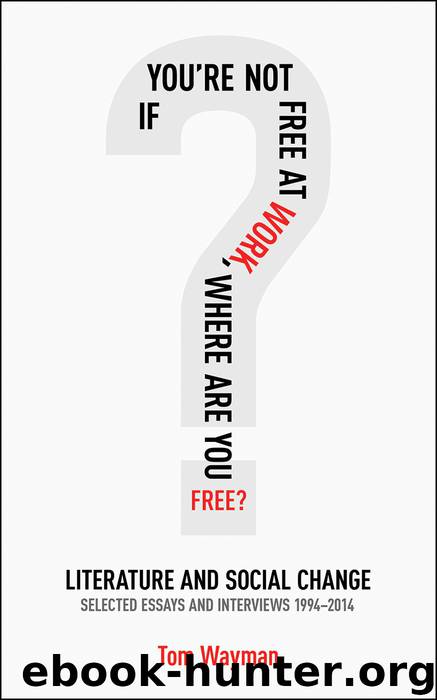If You're Not Free At Work, Where Are You Free? by Tom Wayman

Author:Tom Wayman
Language: eng
Format: epub
ISBN: 9781771832885
Publisher: Guernica Editions
Published: 2018-05-29T04:00:00+00:00
•Postmodern writing is sophisticated and is an artistic reflection of how language functions.
Anyone who has taught postsecondary introductory creative writing has encountered students who do not seek to improve their writing by paying close attention to craft, and thus engage in rewriting. Instead, such a student simply wishes her or his genius to be celebrated. These novice writers reject the idea of substitution or elimination of certain nouns, verbs, or modifiers, or deleting or rearranging passages, in order to generate a more effective communication of her or his intended subject matter. Students with this attitude, who mostly quickly drop the course, are extremely defensive about their work. Where confusion regarding their intent due to their lack of craft is pointed out, such students will invariably reply: “My writing can mean whatever the reader wants it to mean.” If one mentions that this statement is not true—the piece is not about hunting whales, for instance—their response is to sullenly insist that they are absolutely fine with a reader drawing whatever meaning he or she wants from what they have written.
Similarly, an interpretive problem caused by poor word choice, grammar error, change of tense, inconsistent characterization, and the like, is met with the statement, ‘I meant that,” apparently indicating that the creation of such confusion is deliberate. Whatever the student’s original impulse to communicate a specific feeling, idea, or incident presumably meaningful to the student, he or she is willing to abandon that communication rather than have to work to improve the poem or sample of prose—“improve” in the sense that readers would be able to more easily and deeply perceive what the piece aims to convey.
In an identical manner, postmodern authors protect themselves from any weighing of their mastery—or lack thereof—of the craft of writing. Postmodern literature, as mentioned above, is in essence conceptual art: what is vital is the idea behind the form the writing has taken, and not the craft employed in executing this idea. Consider again the creative examples given above, whether Mark Wallace’s
Won’t have to testify about
pigs guilty on the rotunda. Get packing
nomad street misunderstanding
or Jeff Derksen’s
perceived accepted suffered
merely naturally unites
veils cultures call time annihilates space
In neither case can one suggest, as one might in accessible writing, alternative word choice, for example: why is “nomad” a suitable adjective for street? Can one really “pack” a misunderstanding? Two lines both ending in “ing” create a chime for no apparent reason: isn’t this aural effect distracting (the effect is not used in subsequent stanzas)? In addition, is “veils” meant to be a noun or verb? Isn’t “time annihilates space” a cliché, lowering the energy of the poem’s forward motion? Also irrelevant to ask, given that these are conceptual pieces and not intended to be concerned with writing skills per se, is whether either of these poems in its entirety is too long: is the point made early and then repeated and repeated? Equally, one cannot ask whether the mixing of tenses and/or grammatical moods aids or detracts from communicating the poem’s message.
Download
This site does not store any files on its server. We only index and link to content provided by other sites. Please contact the content providers to delete copyright contents if any and email us, we'll remove relevant links or contents immediately.
4 3 2 1: A Novel by Paul Auster(12375)
The handmaid's tale by Margaret Atwood(7757)
Giovanni's Room by James Baldwin(7326)
Asking the Right Questions: A Guide to Critical Thinking by M. Neil Browne & Stuart M. Keeley(5758)
Big Magic: Creative Living Beyond Fear by Elizabeth Gilbert(5754)
Ego Is the Enemy by Ryan Holiday(5413)
The Body: A Guide for Occupants by Bill Bryson(5080)
On Writing A Memoir of the Craft by Stephen King(4935)
Ken Follett - World without end by Ken Follett(4723)
Adulting by Kelly Williams Brown(4565)
Bluets by Maggie Nelson(4547)
Eat That Frog! by Brian Tracy(4525)
Guilty Pleasures by Laurell K Hamilton(4439)
The Poetry of Pablo Neruda by Pablo Neruda(4097)
Alive: The Story of the Andes Survivors by Piers Paul Read(4018)
White Noise - A Novel by Don DeLillo(4002)
Fingerprints of the Gods by Graham Hancock(3996)
The Book of Joy by Dalai Lama(3976)
The Bookshop by Penelope Fitzgerald(3844)
